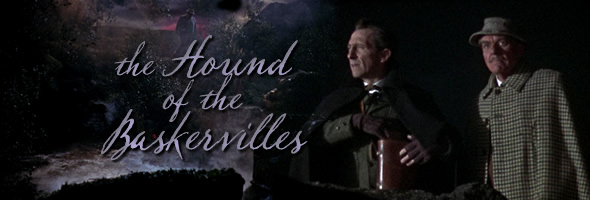

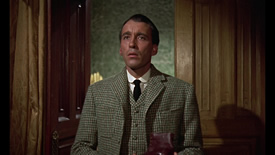
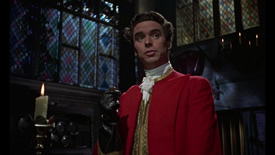 This second feature film version of the most famous Sherlock Holmes mystery came as something of a shock after the iconic Basil Rathbone and Nigel Bruce adventures beloved both before and after World War II. Here the sleuth was revived courtesy of Hammer Film Productions at the start of its run of horror masterpieces, helmed by the brilliant Terence Fisher just after the one-two punch of Horror of Dracula and The Revenge of Frankenstein (and shot the same year he made The Mummy, The Stranglers of Bombay, and The Man Who Could Cheat Death). That's an incredible streak by any standard, and his take on the famous puzzle about murder and mayhem on the moors fits solidly with the colorful, brash aesthetic he was developing with his more overt monster yarns at the time. In fact, this film significantly lays out the groundwork for the visual and narrative experiments he would try with two more masterpieces right after it, Brides of Dracula and particularly The Curse of the Werewolf, which explicitly picks up on motifs and story structure found here.
This second feature film version of the most famous Sherlock Holmes mystery came as something of a shock after the iconic Basil Rathbone and Nigel Bruce adventures beloved both before and after World War II. Here the sleuth was revived courtesy of Hammer Film Productions at the start of its run of horror masterpieces, helmed by the brilliant Terence Fisher just after the one-two punch of Horror of Dracula and The Revenge of Frankenstein (and shot the same year he made The Mummy, The Stranglers of Bombay, and The Man Who Could Cheat Death). That's an incredible streak by any standard, and his take on the famous puzzle about murder and mayhem on the moors fits solidly with the colorful, brash aesthetic he was developing with his more overt monster yarns at the time. In fact, this film significantly lays out the groundwork for the visual and narrative experiments he would try with two more masterpieces right after it, Brides of Dracula and particularly The Curse of the Werewolf, which explicitly picks up on motifs and story structure found here. 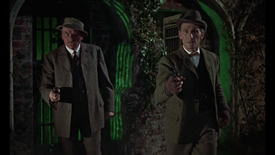 Watson and Christopher Lee
Watson and Christopher Lee 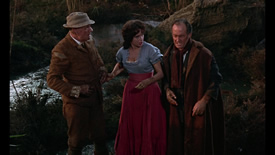 assuming a rare, dignified heroic role as Sir Henry, the Baskerville heir who might be the next in line after his predecessor is found dead of heart failure on the moors. (Lee would also play Holmes in the above-average German outing, Sherlock Holmes and the Deadly Necklace, and appeared as Mycroft Holmes in Billy Wilder's The Private Life of Sherlock Holmes.) The narrative itself is very common knowledge by now, but for the record it involves Holmes and Watson summoned to Baskerville Hall where a family legend about an avenging, bloodthirsty hound seems to be connected to the misdeeds around the property. Holmes sends Watson ahead to perform the physical investigation, and many twists and turns ensue.
assuming a rare, dignified heroic role as Sir Henry, the Baskerville heir who might be the next in line after his predecessor is found dead of heart failure on the moors. (Lee would also play Holmes in the above-average German outing, Sherlock Holmes and the Deadly Necklace, and appeared as Mycroft Holmes in Billy Wilder's The Private Life of Sherlock Holmes.) The narrative itself is very common knowledge by now, but for the record it involves Holmes and Watson summoned to Baskerville Hall where a family legend about an avenging, bloodthirsty hound seems to be connected to the misdeeds around the property. Holmes sends Watson ahead to perform the physical investigation, and many twists and turns ensue. 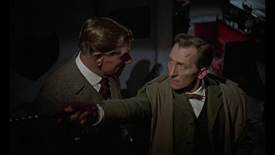 the studio's baffling insistence of presenting films in that aspect ratio in non-anamorphic transfers, a fate that also befell releases of titles like Some Like It Hot and The Train. Extras included the theatrical trailer (which apparently now only exists in black and white) and an entertaining "Actor's Notebook: Christopher Lee" featurette with the thespian talking about friendship with Cushing and his affinity for Conan Doyle. That master was the norm for well over a decade around the world, which was fine for
the studio's baffling insistence of presenting films in that aspect ratio in non-anamorphic transfers, a fate that also befell releases of titles like Some Like It Hot and The Train. Extras included the theatrical trailer (which apparently now only exists in black and white) and an entertaining "Actor's Notebook: Christopher Lee" featurette with the thespian talking about friendship with Cushing and his affinity for Conan Doyle. That master was the norm for well over a decade around the world, which was fine for 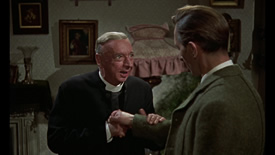 a while but left plenty of room for improvement. Eventually in 2013 an HD master popped up on MGM HD, with an Australian Blu-ray popping up almost a year later.
a while but left plenty of room for improvement. Eventually in 2013 an HD master popped up on MGM HD, with an Australian Blu-ray popping up almost a year later. 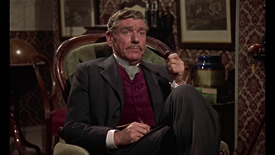
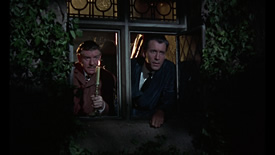 League of Gentlemen member Mark Gatiss, third assistant director Hugh Harlow, and prop chargehand Peter Allchorne. It's fun stuff (with some great canine stories), though be warned the volume bounces up and down tremendously from one clip to the next. The "André Morell: Best of British" offers an interesting 19-minute look back at the actor's career and particularly his Hammer work (and how he wound up playing authority figures) courtesy of his son Jason and authors Denis Meikle and David Mille. Timed to tie in with the international roll out of Young Sherlock Holmes, the 1986 "The Many Faces of Sherlock Holmes" features Lee hosting a 46-minute overview of the various permutations of the sleuth on the big and small screens over the years (from Rathbone to Murder by Decree) including some interesting detours through Conan Doyle's life including his increasing fascination with spiritualism. Two chapters from the novel read by Lee are also included (nearly 30 mins. total) along with a lengthy gallery of posters and stills, the usual eye-catching reversible sleeve art (with the familiar UK poster image on the back), and an illustrated booklet with very thorough liner notes by former Hammer archivist Robert J.E. Simpson, who offers some fascinating speculation about the reasons a second Hammer Holmes was never made and details the three extremely minor cuts required by the censors at the time to get an A certificate, which still seems generous for what remains one of the chilling, full-blooded Holmes films ever brought to the screen.
League of Gentlemen member Mark Gatiss, third assistant director Hugh Harlow, and prop chargehand Peter Allchorne. It's fun stuff (with some great canine stories), though be warned the volume bounces up and down tremendously from one clip to the next. The "André Morell: Best of British" offers an interesting 19-minute look back at the actor's career and particularly his Hammer work (and how he wound up playing authority figures) courtesy of his son Jason and authors Denis Meikle and David Mille. Timed to tie in with the international roll out of Young Sherlock Holmes, the 1986 "The Many Faces of Sherlock Holmes" features Lee hosting a 46-minute overview of the various permutations of the sleuth on the big and small screens over the years (from Rathbone to Murder by Decree) including some interesting detours through Conan Doyle's life including his increasing fascination with spiritualism. Two chapters from the novel read by Lee are also included (nearly 30 mins. total) along with a lengthy gallery of posters and stills, the usual eye-catching reversible sleeve art (with the familiar UK poster image on the back), and an illustrated booklet with very thorough liner notes by former Hammer archivist Robert J.E. Simpson, who offers some fascinating speculation about the reasons a second Hammer Holmes was never made and details the three extremely minor cuts required by the censors at the time to get an A certificate, which still seems generous for what remains one of the chilling, full-blooded Holmes films ever brought to the screen.![]()